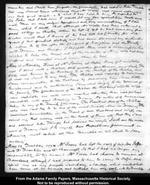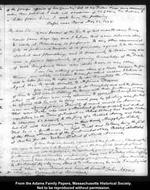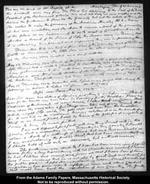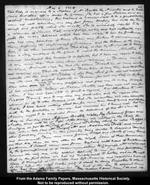May 9. 1778.
This Lady is married to a Nephew of Mr. Bertin the Minister, and he holds some lucrative office under the Crown. She has a fine Person and an excellent Understanding. Her Husband is however said to be a great Libertine worn out with debauchery, and very far from treating her with the tenderness and fidelity which she merits. She is universally reputed to be a Woman of sincere Piety and spotless virtue, and has inflexibly rejected the many Advances which have been made to her by Gentlemen who had every Advantage of Power, Person and fortune to recommend them, preferring the consciousness of Innocence and the Esteem of the very few, to all other considerations. This Lady is said by Dr. Smith to have been a Spy employed by the Court to watch the American Ministers. I cannot contradict this, because it is possible, but I have no reason to believe it, any more than that every Man and Woman in France were so employed.Dr. Smith says too, that she adored Franklin as much as she despized me. That she respected Franklin is very true, and that she respected Mr. Lee and Mr. Izzard is also true. And if she did not respect me she was the greatest hypocrite in France: for not one Lady in the Kingdom ever gave memade me so many professions and gave me so many proofs of her invariable Esteem as Madam Bertin, and there was not one for whom I had and have still so great a regard. Her Attentions to Mr. Izzards Family and to me, were very particular, and the reason she assigned for it, to other Persons, was that she understood We were domestic People. I have heard nothing about her for more than twenty Years, and whether death by the Guillotine or otherwise has removed her I know not: but her Memory ought to be vindicated from the Aspersions of this Dr. Smith.
May 10. Sunday, 1778.
Messieurs Brattle, Waldo, Joy, Johonnot, Green and Austin, dined with Us, at Passi. After dinner We walked in the Bois de Boulogne, as far as the
new Seat of the Count D'Artois, which he called Baggatelle, where We saw Mr. Turgot, Mr. and Madam La Fr t and much other Company, Sunday in this Country being devoted to diversions, Exercises and Amusements. There were more Games, Plays and Sports of every kind on that day than on any other in the Week. Some of these American Gentlemen I suspect came over from England, with hopes of Employment by the Commissioners or of recommendations to Congress. Mr. Waldo was however the only one who applied explicitly to me for that purpose. But in the first place We had no Employments to bestow, and in the next place, I thought as Mr. Waldo had left America and resided in England so long before the War broke out, it would be doing Injustice to others who had born the
burthen in the heat of the day, to appoint him to any place worth his accepting. The Answer I gave him, I do not
re
Page 2
member, and should have forgotten the Conversation, had not Sir John Temple told me, several Years afterwards that Mr. Waldo was much offended and took great exceptions to what I had said to him. He reported to Sir John that I told him I would set my face against him tooth and nail. These are very vulgar Expressions and were very unnecessary, if I said them, which I doubt. But although Mr. Waldo had been esteemed a good Whigg in Boston, when he left it, yet he had never any particular merit that I knew of, he had left his Country for six Years of her greatest distress, and had never discovered any inclination to return to it, till after the Conquest of Burgoine and the Treaty with France and therefore I thought there was a meanness in his Wishes to take the bread out of the mouths of Men, who had done, suffered and merited much more than he had.
May 11. Monday.
Dined at Mr. Sorins, at Passi. Here, if I mistake not I dined with a Bishop, and another Gentleman and Lady. The Lady was known by the Husband to be the Mistress of the Bishop, and it was no Secret to any body. The Bishop was reported to have made some compensation to the Husband, by procuring him some little Employment and by contributing some what largely to the
Expences of the family. The Countenances of the Bishop, the Husband and the Wife were watch'd by me with more marked Attention, than was perhaps compatible with good Breeding in France. No notice of it, however was taken by any of the
Family Company. The jesuitical face of the Bishop, who was said too, to be one of the most sensible Men in France, The conscious humiliation in the Faces of both Husband and Wife, convinced me, that misery was in the hearts of them all: that they saw and approved better Things, but followed the worse. Such are the manners of France, said I to myself. Our Republican Governments in America, must exclude all these Examples or We shall be soon undone.
May 12. Tuesday. 1778.
Mr. Deane had left the care of his Son Jesse with Dr. Franklin and Dr. Bancroft, so that I had no longer any responsibility, on his Account. Mr. Vernon had chosen to remain at Bourdeaux, although I had proposed to him to come to Passi and assist me as my private Secretary, a Situation which would at least have borne all his
Expences, and initiated him very early, into the Knowledge
Page 3
of the foreign Affairs of his Country: but as his Fathers Views were commercial rather than political, I could not disapprove of his Choice. In Answer to a Letter from him I wrote him the following
Passi, near Paris May 12. 1778
My dear Sir
Your favour of the tenth of last month came to my hands some days ago, and I believe that your determination to reside at Bourdeaux, in preference to any other commercial City is judicious, because it is generally agreed to be the most oppulent and flourishing; and its proximity to Spain may give you a fairer Opportunity of gaining Knowledge of the Trade of both Kingdoms, than you could have, in any other.
I can say nothing of your choice of a House, because the Gentlemen are wholly unknown to me; for which reason I believe it will be better for me, to refer you to Mr. Bondfield the American Agent, than to write directly to Messieurs Feyers.
Give my Compliments to Mr. Bondfield, and ask the favour of him to assist you in settling the terms with those Gentlemen or any other with whom you may determine to agree. Mr. Bondfield may be assured that he will be doing much good, by assisting you, for that you are sprung from a Family of much merit, in America. That your Father who was a Merchant of large property and excellent reputation, in the Town of Newport in Rhode Island, has had the Virtue to abandon his property to the fury of a British Army, and take his Lot with his Countrymen, in their hardy Struggle for Liberty. That he is a Gentleman in high Trust and Esteem, being the first of the three Members of the Continental Navy Board, established at Boston, for the Eastern District of North America.
If these things are decently represented to those Gentlemen, I doubt not, they will agree to take you into their family: and Mr. Bondfields Goodness of heart I am convinced, will be gratified by the Opportunity of rendering this Service to a young Gentleman of liberal Education and promising hopes, and to a Father, whose Sufferings and Services, have deserved this friendship of his Countrymen. Shew this Letter to Mr. Bondfield, who may shew it, to whomsoever, he will. I am, Sir, with much Esteem, your Friend and humble Servant
John Adams
Mr. William Vernon Jur. at Bourdeaux.
Page 4
This day We dined at Mr. Dupr s, at the Montagne. The Gardens and the prospects were very fine. The Place lies adjoining to the Seat of the First President of the Parliament of Paris. We met his Lady in our Walks, and she desired the Gentlemen to shew Us the Grounds, but not the whole of them, for she wished to enjoy the Company of the American Ministers, At her house, at her own invitation, and she chose to reserve a part of the Curiosities of the place as an inducement to Us to accept it. Compliments are so essential a branch of the Science of Life, the Savoir vivre, in France, that it is astonishing how prompt and ingenious, they are in producing them.
From this Hill We had a fine View of the Country, and of the Kings Castle at Vincennes. My little Son and the other young Americans at the Pension, were invited and dined with Us.
May 13, Wednesday. 1778.
Dined at Mr. Chaumonts, with a great deal of Company. After Dinner took a Walk to Chaillot to see Mr. Lee, who had a large Company of Americans to dine with him, among the rest, Mr. Fendell of Maryland and Dr. Smith, Brother of Mr. William Smith of New York the Historian. This Gentleman has been occasionally mentioned before.
May 14. Thursday. 1778.
Under this date, I find in my private Letter Book, the following in Answer to Letters received from Mr. McCreery
Passi near Paris May 14. 1778.
Dear Sir
Your two Letters of April 25, and May 3 are before me. I thank you for the trouble you have taken in searching for the Breeches. I have no suspicion of the Servants at your house. I rather think conjecture that once, upon the road, when a few Things were taken out of my Trunk, this Article might slip aside. The Gold could not have been the temptation for it was hid in the Waistband. However, whether it is in the hands of a Thief or an honest finder, I wish he knew of the Gold for it might be of Service to him. So much for that.
I am not disposed to find fault with any thing I meet with, in this Country. Such a disposition, in any Traveller, in any Country, I should esteem a Mark of a littleness of Mind: but in a Person situated as I am, and sustaining the public trust, that has been committed to me, I should hold it, not only an Absurdity, but a Misdemeanor.
The Gentleman you allude to, I hope has been more upon his guard, because from a long Acquaintance, with his Character and conduct, I know he has Abilities and merit, and, from all that I have seen of him here, I am convinced that he is actuated by great Zeal and Anxiety for the public good.... A fatal Misunderstanding, between some Characters, of importance, has given rise to reflections upon each others Conduct that must have hurt the reputation of our Country. The Gentle




